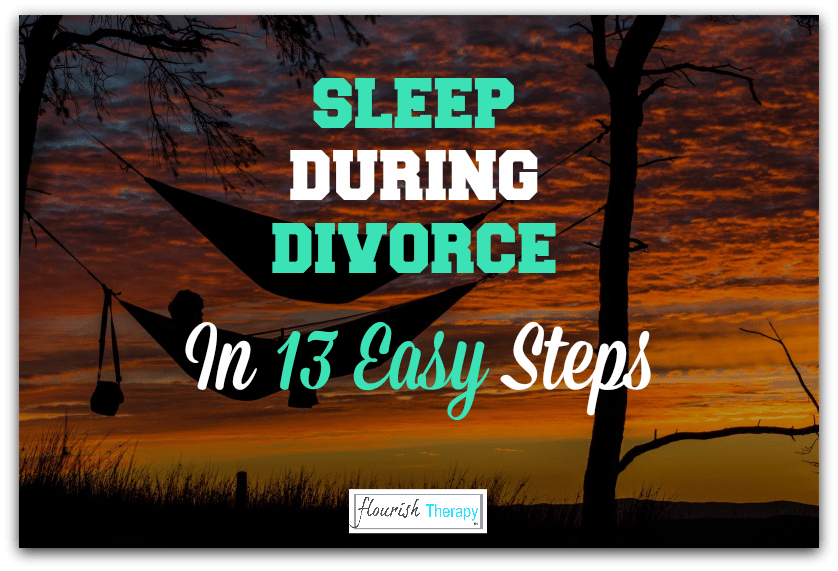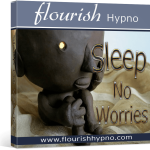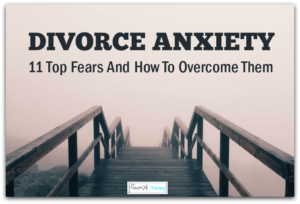Sleep During Divorce in 13 Easy Steps
Sleep During Divorce in 13 Easy Steps
Sleep is the cornerstone of good health. It’s nearly as vital as breathing. Without it our systems begin to fail and we lose our ability to think clearly and creatively. However, sleep during divorce can be a difficult thing to achieve. When we’re sleep deprived it’s easier to fall into bad habits. Consequently, we don’t have the energy to exercise, we eat the wrong foods which leave us feeling fatter and even more depleted. Furthermore, we may increase our alcohol content and we flood our systems with stress hormones which hold on to fat in a bid to protect our bodies.
During divorce, many of us feel overwhelmed and anxious about the future. Emotional chaos ensues and there seems to be no light at the end of the tunnel. But you will find that by taking care of yourself while you are in the throes of a divorce will make a big difference in how you manage your daily struggles.
The importance of sleep to our brains and bodies
Sleep is when our bodies repair themselves. In essence, when you are sleep deprived you put your immune system under enormous pressure and brain fog becomes a regular problem. When you are sleep deprived it will make decision-making all the more difficult, and while you’re going through a divorce, you need to have a brain which is focused and able to make the right decisions for you now.
Research into erratic sleep patterns suggests that we gain weight, suffer poor memory recall, increase our risk of heart attack, high blood pressure, cancer, diabetes, anxiety and depression. Sleep deprivation is even a form of torture, so don’t underestimate how much harm it can do to your body.
Read below to discover 13 easy strategies for getting a good night’s rest when your divorce is making it difficult to sleep like you need to.
HEALTH
1. Deep breathing to relax you
Learn how to deep breath. Oxygen plays a crucial role in all chemical reactions in the body from releasing cellular energy to fuel our organs to keeping our mind sharp and skin clear and youthful looking.
When you inhale deeply, you are boosting the cleansing action of your lymphatic system which carries away poisons from the body for excretion. Importantly, the lymphatic system relies upon breathing to pump lymph around the body, and a body free of toxins, is a healthy way to prime for a good night’s sleep. Also, deep breathing can help lower the levels of cortisol, a stress hormone associated with the fight and flight response, leading to improved relaxation.
Stimulate your vagus nerve to relax you
Deep breathing stimulates the vagus nerve which runs from the brain all the way down through to the abdomen. Stimulation of the vagus nerve reduces the heartbeat, blood pressure and relieves stress. We can’t be relaxed and anxious at the same time, can we?
Stimulation of the vagus nerve has such a positive effect on the body that it forms part of the treatment for clients with depression and anxiety related disorders. So, how do we deep breath?
Deep Breathing Exercises
- Lie down or sit in a comfortable chair, maintaining good posture. Your body should be as relaxed as possible. Close your eyes. Scan your body for tension.
- Pay attention to your breathing. Place one hand on the part of your chest or abdomen that seems to rise and fall the most with each breath. If this spot is in your chest you are not utilizing the lower part of your lungs.
- Place both hands on your abdomen and follow your breathing, noticing how your abdomen rises and falls.
- Breathe in through your nose.
- Notice if your chest is moving in harmony with your abdomen.
- Now place one hand on your abdomen and one on your chest.
- Inhale deeply and slowly through your nose into your abdomen. You should feel your abdomen rise with this inhalation and your chest should move only a little. Try and breathe in for six seconds, hold the breath for 12, and if you can do, exhale for the count of 10. Practice makes perfect with this technique.
- Exhale through your mouth, keeping your mouth, tongue, and jaw relaxed.
- Relax as you focus on the sound and feeling of long, slow, deep breaths.
Aim to practice these exercises in the morning and before going to bed. You will experience a noticeable shift in how relaxed you are feeling as well as improved feelings of well-being. If you wake up during the night, give deep breathing exercises a go. I think you’ll be surprised as to how effective they are at getting you back off to sleep.
2. Meditation to help you sleep
While I’m not suggesting you get up in the middle of the night and attempt to look like a human pretzel, I do recommend establishing a visual “zone out” that works for you. When I wake up with worries, I either do the deep breathing exercises, or I do a sort of meditation. Essentially I focus on an image which is unattractive to me and one I don’t really like
I love nature and all things earthy, so my visual “zone out” is a little bizarre and I have no idea how it arrived in my head. Basically it’s an oddly shaped triangular lump of concrete with a couple of bits of rusty metal sticking out of the right hand side of it. When I visualise it, it’s always to the left of my visual field. It’s quite close up and the background is blurry. I can’t tell you why it works, but for me it works every single time I use it.
Next time you wake up with worries, try and visualise something that’s totally unstimulating to you. By the time I have focused on the concrete for about 5 minutes, I find I have drifted back off to sleep.An alternative to deep breathing and meditating is to try hypnosis. I have created a hypnosis download specifically designed to help you park the worries during bedtime.
Meditation as part of your daily practice
Meditation as a regular practice to your daily schedule is a no-brainer. By learning to clear our minds, we become much more adept at managing our emotional responses to triggers. Regular meditation will settle you, boost your immune system, give you greater mental clarity as well as helping you sleep more peacefully. When you delve into the world of meditation it is surprising to learn just how many different types of meditation there are, which for some, can be quite confusing and offputting – just go with what works for you. If you’re new to meditation, check out these free resources on How To Meditate and Meditation Mantras.
Regular meditation will settle you, boost your immune system, give you greater mental clarity over your divorce as well as helping you sleep more peacefully. Click To Tweet3. Get moving to help you sleep
Exercise is one of the best stress-busters out there. Unfortunately, when we most need exercise we tend to do it the least. Lack of sleep makes us feel lethargic and it’s difficult to set the alarm clock an hour earlier to get our moves in before the day kicks off. However, if you can peel yourself off the sheets, do it. It helps to keep your blood pressure stable during the day. Furthermore, it increases your metabolism which will help you burn calories.
Importantly, it will improve your sleep at night-time. Unfortunately, during divorce, many of us end up with zero confidence and low self-esteem. So by exercising regularly, you will have a body that feels toned which will help to boost your self-confidence and give you that all-important lift. Ideally you want to be exercising in the morning, as that is when we have a natural spike in the stress-hormone, cortisol. Cortisol will help motivate you to exercise. Consequently, as the day progresses and your natural cortisol spike comes down, you might find your enthusiasm drops off and exercise will be relegated to the following day’s to-do list.
Avoid strenuous exercise in the evening
Avoid strenuous exercise for a minimum of three hours before bedtime. Exercise activates the adrenal glands and the production of cortisol. While exercising in the morning makes good use of cortisol, exercise in the evening increases the negative effects of cortisol in the body. I used to run a Krav Maga martial arts club for 90 minutes in the evening twice a week. Despite being physically exhausted I could never sleep well following those sessions.
FOOD AND DRINK
4. Avoid caffeine
Avoid caffeine (tea, coffee, carbonated drinks) from mid-afternoon onwards. Ideally drink only water in the afternoon and evening, or herbal tea such as Sleepy Tea by Clipper (you can find it in most supermarkets) which is a specially formulated blend of herbs designed to encourage a healthy night’s sleep. If you can’t give up coffee, try either a decaf variety or even better, try out Teecino. It’s not quite the same as coffee, but is a good alternative. If your health is a priority, Teecino is a worth-while change to make. Chamomile tea is also known for its sleep-inducing properties.
5. Avoid sugary foods
Avoid sugary foods for a minimum of three hours before bed. Elevated blood sugar levels can leave your body feeling anxious and result in erratic sleep patterns.
6. Avoid excessive alcohol
Avoid drinking large amounts of alcohol before bed. Heavy alcohol drinking impacts negatively on general health, but many people enjoy a glass or two in the evening of their favourite tipple. This is fine, but don’t go overboard. Too much alcohol will fragment your sleep and make you feel drowsy the following day.
If reducing your alcohol is a problem for you, you might be interested to try out a specifically designed hypnosis download to reduce the amount you drink. It’s a painless way of cutting down and very effective.
ENVIRONMENT
7. Turn off the lights for a better night’s sleep, including your phone!
Sleep in a dark room. Turn off landing lights, turn alarm clocks away from the bed and anything that may transmit a light. If you have a lit digital alarm, avoid at all costs, the blue or green displays. Importantly, if you have the option of choosing a red or orange display colour, do so as they are less interrupting. The blue and green displays affect our natural circadian rhythm.
Ideally exclude television an hour before bed and do something less stimulating such as reading or listening to relaxing music, or cuddle up! Reading in bed with a low wattage night light can be a good way to make the transition into sleep time preparation. If you do read, make sure it’s something that doesn’t stimulate you too much!
8. Sleep in a darkened room
Use black-out curtains to make the most of your night’s sleep during the spring and summer months.
Even through shut eyes, the optical nerve will pick up light and pass it directly to the hypothalamus, the part of our brain which controls our biological clock. Our skin also is full of light receptors which signal the body to wake when light is available. Personally I love sleeping in a very dark room by having no lights on at all, but I have no curtains as I enjoy waking up when the dawn naturally wakes me. It just seems to suit my body clock well. I tend to go to bed by 10.00pm and read, waking up when the day breaks. Importantly find out what works for you best ensuring that you’re getting the best sleep for you in the time you have available.
9. Help your hormones help you to sleep
If we are disturbed by light during the night hours, our pineal gland’s production of melatonin and serotonin can be disrupted. Melatonin is a hormone and an antioxidant. Among its many uses in the body, melatonin secretion is highest during the darkest hours and helps to promote good sleep. Serotonin is a hormone which regulates our moods and we need a healthy amount to keep us feeling fresh, happy and balanced.
To help with melatonin and serotonin production, if you have a source of protein for your evening meal, eat a small piece of fruit shortly afterwards which will help the L-tryptophan (an amino acid found in protein) to cross your blood/brain barrier. L-tryptophan helps to boost our feel-good hormones.
Foods high in tryptophan:
- Oily fish
- Avocado
- Eggs
- Turkey
- Bananas
- Nuts
- Coriander
- Tofu
- Turmeric
- Cheese
- Fermented foods
- Pineapple
- Dark chocolate
10. Increase your UV exposure
One of the best ways to boost melatonin production is to make sure you get a minimum of 30 minutes UV exposure every day, as well as regular exercise. Midday sun (so long as you’re not burning) is the best for melatonin stimulation, but any is better than none. Ideally take a daily walk in nature. Not only will you be increasing your melatonin production you will be exercising and absorbing phytoncides, all good for a calm and focused brain. Phytoncides are given off by trees and plants to protect them from pests and disease and also boost our immune systems as we absorb the phytoncides through our mucous membranes.
11. Sleep in a cool room
Keep your bedroom cool – no warmer than 68°F / 20°C. A cool bedroom is conducive to getting a better night’s sleep. Ideally leave a bedroom window open to allow a healthy flow of fresh air. Wearing socks in bed has been proven to promote a good night’s sleep too.
12. Sleep under a weighted blanket
If you are feeling anxious in bed, a weighted blanket is a simple remedy. You can spend quite a bit of money on a “therapeutic weighted blanket”, but all you really need to do is add a couple of layers to your bed covers. A weighted blanket should be no more than 10% more of your body weight. So if you weight 60kg, your blanket should weigh approximately 6kg.
Make sure your room is sufficiently cool to counteract the additional weight on your bed. Weighted blankets have been proven to improve sleep during anxious times.
13. Create healthy sleeping habits
Finally, stick to a regular pattern, even at the weekends. This allows your sleeping to become a habit. The neural pathways in the brain will establish it as such, and within 30 days, with good sleep habits, you should be well on your way to sleeping success. This means going to bed at a similar time every night and getting up at a similar time every day. It WILL help in the long run.
In a nutshell:
- Practice deep breathing exercises
- Meditate
- Exercise in the morning
- Avoid strenuous exercise
- Avoid sugar, caffeine and alcohol
- Avoid bright lights
- Sleep in a dark room
- Let your hormones do what they need to do naturally
- Get your daily dose of UV light
- Keep your room cool
- Feel secure in bed
- Build your healthy sleeping habit
And sweet dreams!



























